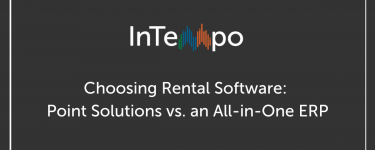Behind the Buzzword: “Interoperability” in the Rental Industry
A few days ago, IronPros shared an article that covered the top three construction technology trends for 2023.
Their predictions?
- Consolidation of the market
- Interoperability
- Technology coming to the field
There’s a lot to be said about all three of these predictions, but let’s take a deeper look at prediction #2.
What is interoperability?
In tech terms, interoperability is “the ability of different systems, devices, applications, or products to connect and communicate in a coordinated way, without effort from the end user.”
In the real world, it’s a way for businesses to work more efficiently and speed up their most important processes.
As IronPros puts it:
“Stakeholders [are working to] understand the relationships between people, processes, technology and data by aligning common processes and interactions with documents of record in a system of record like enterprise resource planning (ERP).”
And, in the context of their construction audience:
“Because construction projects are typically executed not by a single corporate entity but by several—owners, generals, subcontractors, and other vendors—processes critical to success must be handed off seamlessly between different organizations. This means requests for information, change orders, applications for payment, certificates of insurance, work-in-progress (WIP) reporting, lien waivers, amendments to contract terms and more are all making the transition in many projects into multi-company digital workflows.”

Interoperability in the rental industry
On the rental side, companies don’t necessarily have to worry as much about handing projects off from phase to phase to phase. However, they still have to manage documents and data from a variety of sources.
Many rental businesses use a designated ERP system to manage their invoices, purchase orders, warranties, safety sheets, inspection records, and other business documents “under one roof”. But, there are still cases where they use external, third-party software for specific processes. For instance, sales teams may use CRM software to track opportunities and customer communications; maintenance managers may use telematics systems to plan for usage-based service. That’s where interoperability becomes critically important.
As fast as things move in the rental industry, nobody has time to waste searching for data across multiple systems. Employees need a single source of truth where they can turn for information – or that they can update once and use to push those updates to other systems.
Need to know what jobsite a specific machine is at? Check your ERP. Need your e-commerce platform to update your rates when you make changes based on current market conditions? Pull the data from your ERP. You’re not manually updating information multiple times, in multiple places, or creating situations where your yard has no idea what your counter is doing (and vice versa).
The importance of real-time updates
Taking the interoperability concept one step further: it’s not enough for systems to push data back and forth once or twice a day in a batch process. To keep your rental business running smoothly, information has to be updated in real time. If you’re waiting for data to sync once or twice a day, you’re just creating more bottlenecks.
How InTempo is approaching interoperability
Taking things back one more time to the IronPros prediction:
“We predict one or more major announcement and many smaller ones as vendors create, if not bridges, reliable maps to a shared future of construction interoperability.”
That’s the exact approach we’re taking on the rental side.
Certain third-party platforms are market leaders for a reason. They offer best-in-class functionality, and their development teams are continuing to create solutions that meet the unique needs of the rental industry. We’re investing in partnerships (most recently, with DOZR and LHP Telematics) to give customers all the tools they need to grow their rental business, without having to manage a complicated patchwork of disconnected systems.
We’re making it so that rental businesses shouldn’t have to choose between a best-in-class ERP and best-in-class point solutions. We’re proving that companies can have it all: a single place to carry out their core processes, with real-time integrations into other systems. With the knowledge that technologies will continue to evolve – and become more essential to our customers’ success - we’re working to build a fully connected world. When new tools hit the market – and they will – users won’t have to wonder whether it’ll even be possible to add something new to their tech stack. They can seamlessly incorporate it into their ecosystem, connect it with their ERP, and turn their attention back to growing their business.
Ready to learn more about better tools for your rental business? Contact InTempo to learn about a connected world of software solutions.

